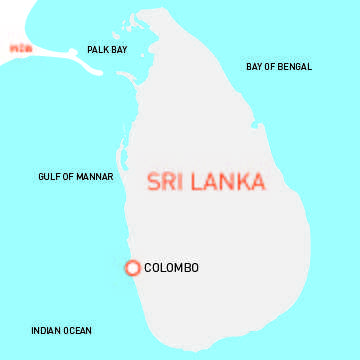Questions about Sri Lankans’ human rights remain unresolved
April 12, 2011
Human rights have been a major topic in the Sri Lankan media and have been brought to light by numerous journalists and non-governmental organizations.
Sri Lanka recently pulled out of a 26-year civil war and is desperately trying to rebuild itself. The bloody war between the Sri Lankan government and the rebel group, the Liberation Tigers of Tamil Eelam, produced numerous human rights violations and war crimes that drew the attention of both foreign governments and non-governmental organizations across the globe.
The Liberation Tigers of Tamil Eelam is a separatist organization based in northern Sri Lanka that began a movement attempting to form an independent Tamil state in the late 1970s. The organization is known for its terrorist attacks and assassination of Sri Lankan government officials.
Both sides of the conflict have been accused of numerous human rights violations, including the use of human shields, indiscriminate shelling and preventing essential humanitarian aid from reaching the population.
Separatist forces even allegedly forcibly recruited civilians, including children, into their ranks, which contributed to the massive number of deaths that are estimated between 80,000 and 100,000, through the quarter of a century of conflict.
Although both parties have been accused of war crimes and crimes against humanity, presently, none have been tried, according to the Human Rights Watch report.
Despite the attempted intervention of foreign parties, the populace continues to struggle. According to a report from the Human Rights Watch, the Sri Lankan government continues to attempt to control the population through threats and attacks on humanitarian workers, journalists and human rights defenders.
However, the situation may be quite different than how it is depicted in the Human Rights Watch reports and accounts from journalists, including Poddala Jayantha, a Sri Lankan journalist who recently spoke at Iowa State as part of First Amendment Day.
Incidentally, some ISU students from Sri Lanka see the issue very differently. Migara Perera, junior in mechanical engineering and resident of Colombo — the capitol of Sri Lanka — has a completely different opinion of his government and the separatists.
“There is no way [the Liberation Tigers of Tamil Eelam] can be a good party,” Perera said. “There is no way we should give human rights for them because they were killing innocent people. So, how can we give human rights to them?”
Accordingly, he is supportive of his government and optimistic for his country’s future.
“Right now they’re trying to get on the level with the minorities,” Perera said. “It’s not easy. It’s the nature of the world, even in this place. Everywhere the minority suffers, but not like those days. Right now, the government is trying to rehabilitate the [The Liberation Tigers of Tamil Eelam] how they can. They’re trying their best.”
Sarini Mapalagama, junior in industrial engineering, had a similar opinion of the situation. She, too, is wary of the separatists.
“There were lot of suicide bombings going on in the country, and it was frightening while there was traffic on the roads, since we wouldn’t know when the next bomb would explode,” Mapalagama said in an email. “It was frightening to use public transportation since [the Liberation Tigers of Tamil Eelam] targeted [sic] places where there would be many people as possible.”
Mapalagama was also skeptical as to the reports issued from the numerous journalists and non-governmental organizations within the country, including the work of Poddala Jayantha.
“I personally wouldn’t like him since he is a [the Liberation Tigers of Tamil Eelam] supporter,” Mapalagama said. “The whole country was trying to win the civil war against [the Liberation Tigers of Tamil Eelam] and few journalists like this give out wrong information to the world, when we were in the middle of a war.”
She, too, is optimistic for the future and confident in her government.
“The government is taking measures to develop the country after winning the war against terrorists,” Mapalagama said. “Millions of Rupees were lost due to the war, but now all the government owned money can be used for the betterment of civilians.”
Mapalagama was also critical of the efforts of the United Nations and supportive of her government.
“[The] U.N. mentioned that the government violated human rights during the war. But the president denied that argument since the forces are not commanded to kill innocent civilians but to attack only the terrorists,” she said. “[The Liberation Tigers of Tamil Eelam] was violating human rights as they were training young children to become soldiers and to become suicide bombers.”
Disagreements between the citizens and the government raise further questions that remain only to be solved through time.

















